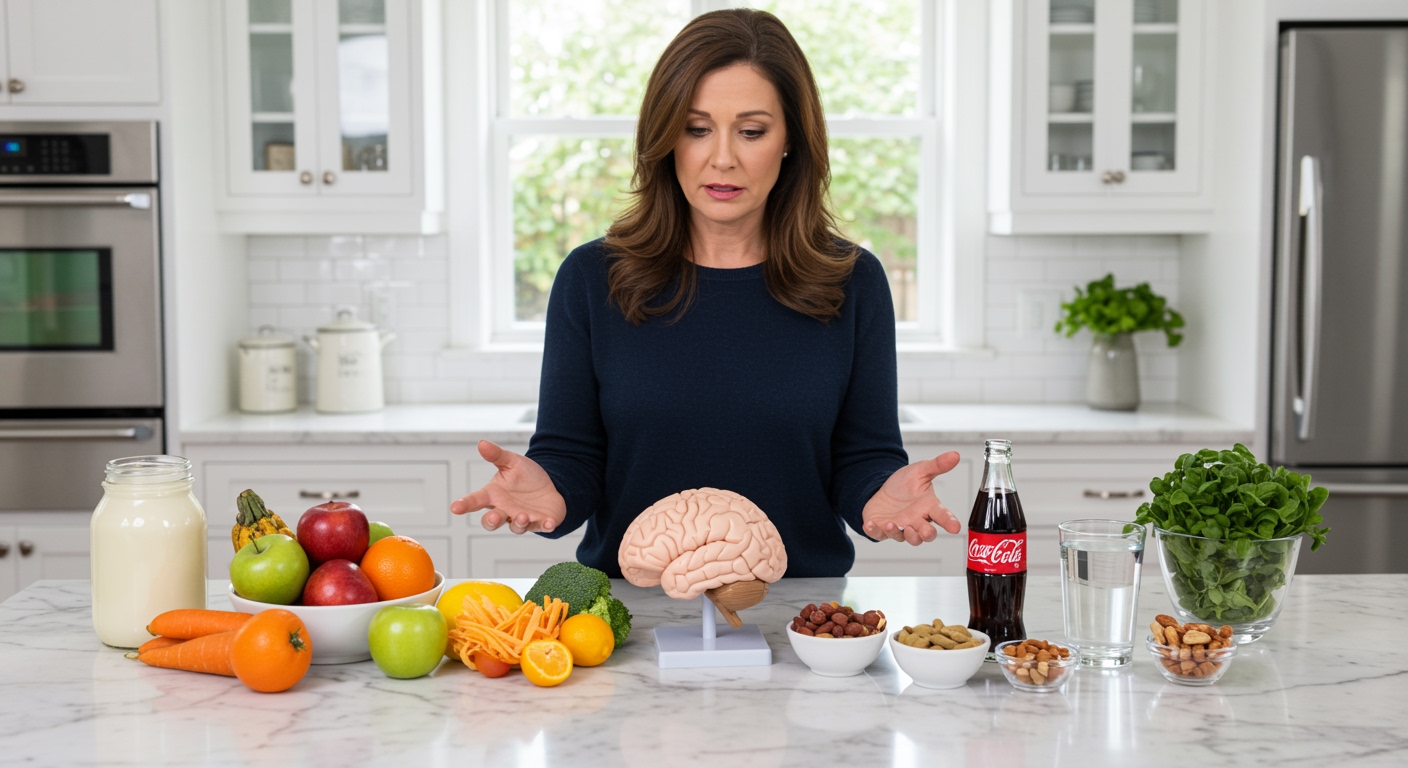✪ Key Highlight: Poor diet quality physically changes brain chemistry and structure, triggering depression through altered neurotransmitters.
Introduction
Your morning donut might be doing more than expanding your waistline.
New research published in Nutritional Neuroscience reveals that poor diet quality physically alters your brain chemistry and structure in ways that directly trigger depression and anxiety.
Hi, I’m Abdur, your nutrition coach and today I’m going to analyze this groundbreaking research that shows how sugar and processed foods are literally rewiring your brain for mental illness.
How Does Poor Diet Change Your Brain Chemistry?
Scientists discovered that people eating high-sugar diets and saturated fats show dramatic changes in their brain’s neurotransmitter systems.
Dr. Piril Hepsomali from the University of Reading found that unhealthy eating creates an imbalance between GABA and glutamate neurotransmitters.
GABA acts as your brain’s natural brake system, helping you feel calm and relaxed.
Glutamate works as your brain’s accelerator, making you feel alert and excited.
When poor diet disrupts this delicate balance, your brain gets stuck in overdrive mode.
The research also showed that processed foods reduce gray matter volume in your brain’s frontal region.
This area controls mood regulation, decision-making, and emotional responses – exactly what gets damaged in depression and anxiety.
✪ Fact: Your brain’s frontal lobe physically shrinks when you regularly consume high-sugar and processed foods.
Which Specific Foods Trigger Depression?
A cross-sectional study of 129 adults identified the worst culprits for mental health.
Sugar-sweetened beverages showed the strongest link to higher depression rates among participants.
This includes sodas, energy drinks, sweetened teas, and fancy coffee beverages loaded with syrups.
Researchers from Nanjing Medical University discovered that high-salt diets trigger depression-like symptoms through immune system changes.
Excess salt activates inflammatory pathways that produce IL-17A, a protein that directly affects mood regulation.
The study found that people with depression specifically crave carbohydrate-rich foods like sweets, bread, and pasta.
These cravings create a vicious cycle where depression drives poor food choices, which then worsen depression symptoms.
✪ Pro Tip: Replace sugary drinks with sparkling water and fresh fruit to break the depression-food cycle immediately.
Can Healthy Foods Actually Prevent Depression?
Harvard researchers made a stunning discovery about the power of citrus fruits for mental health.
Eating just one orange daily reduces depression risk by 20 percent through gut-brain connections.
Citrus fruits promote beneficial bacteria growth in your intestines, which then boost production of serotonin and dopamine.
These neurotransmitters directly control mood, happiness, and emotional stability.
The same study found that dietary fiber consumption significantly lowers anxiety levels in adults.
Fiber feeds your gut’s good bacteria, creating short-chain fatty acids that reduce brain inflammation.
Research on young men showed that switching to a Mediterranean diet rapidly improved depression symptoms within weeks.
✪ Note: Mediterranean diet includes olive oil, whole grains, fish, and plenty of colorful vegetables for brain protection.
Do Depression Supplements Really Work?
Scientists analyzed 64 over-the-counter products to determine which supplements actually help depression.
Omega-3 fatty acids showed mixed results, with some studies showing benefits while others found no effect.
St John’s Wort and saffron supplements performed as well as prescription antidepressants in multiple clinical trials.
Probiotics and vitamin D consistently reduced depressive symptoms better than placebo treatments.
Emerging evidence suggests that folic acid, zinc, and tryptophan may also provide mental health benefits.
However, supplements work best when combined with dietary changes rather than replacing healthy eating habits.
The research emphasizes that whole foods provide superior benefits compared to isolated supplement compounds.
✪ Pro Tip: Always consult your healthcare provider before starting any supplement regimen for depression management.
What Role Does Gender Play In Diet-Depression Connection?
The research revealed significant differences between how men and women respond to dietary influences on mental health.
Women in the study experienced higher rates of both depression and anxiety compared to men with similar eating patterns.
This difference may relate to hormonal fluctuations that affect neurotransmitter sensitivity in female brains.
Estrogen and progesterone changes during menstrual cycles can amplify the negative effects of poor nutrition on mood.
The study also found that moderate caffeine intake (100-300mg daily) helped reduce depression symptoms in both genders.
However, consuming too much or too little caffeine eliminated these protective benefits completely.
Women may need to pay extra attention to their diet quality during hormonal transitions like pregnancy, menopause, and monthly cycles.
✪ Fact: Women’s brains are more sensitive to diet-induced mood changes due to hormonal fluctuations throughout their lives.
The Bottom Line
This research proves that your daily food choices directly shape your brain chemistry and mental health outcomes.
Your fork is more powerful than your pharmacy when it comes to fighting depression.
What questions do you have about using nutrition to support your mental health, and have you noticed any connections between your diet and mood in your own life?
References
At NutritionCrown, we use quality and credible sources to ensure our content is accurate and trustworthy. Below are the sources referenced in creating this article:
- SciTechDaily: How Depression Rewires Your Appetite and Increases Cravings for Carbs
- Frontiers in Nutrition: Dietary patterns and mental health outcomes
- SciTechDaily: Food, Depression, and Anxiety: How Dietary Patterns Sculpt Brain Chemistry and Mood
- ScienceDaily: Diet and mental health research findings
- SciTechDaily: Harvard Study Finds Eating an Orange a Day Could Cut Depression Risk by 20%





